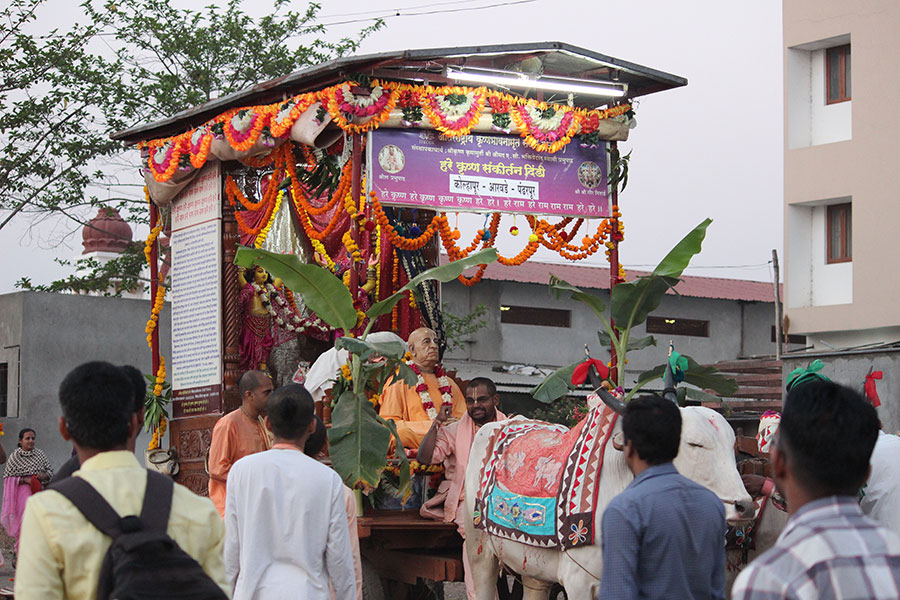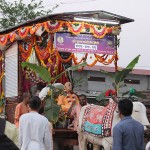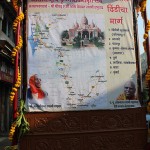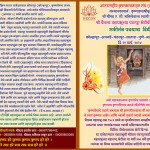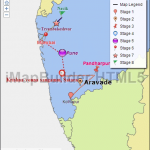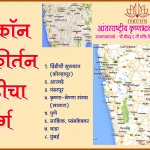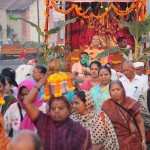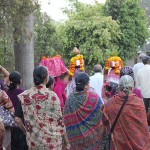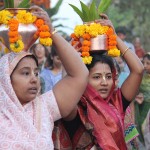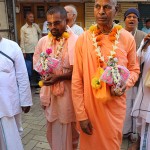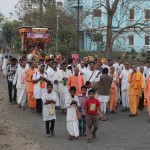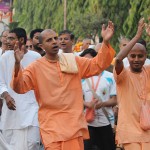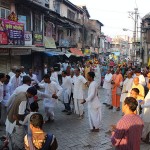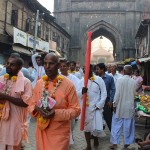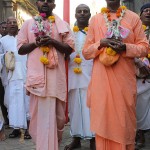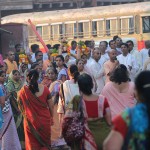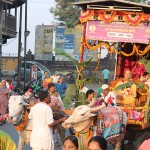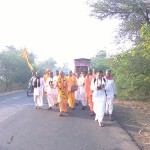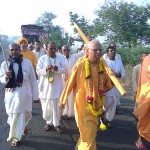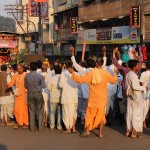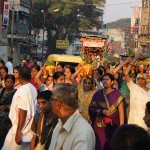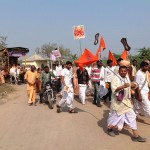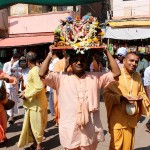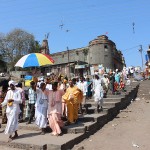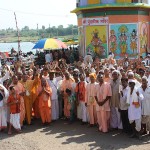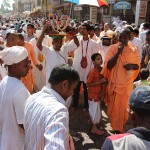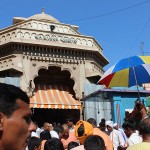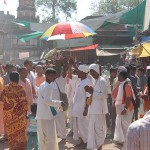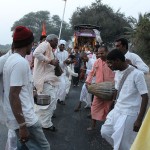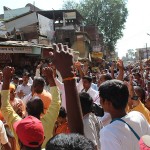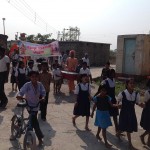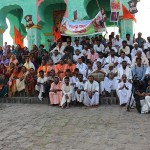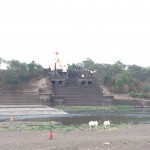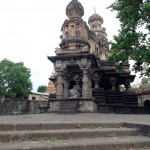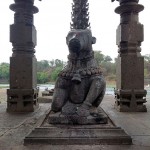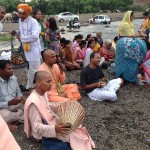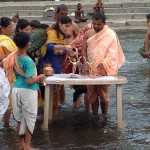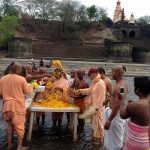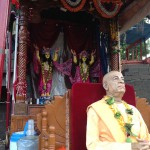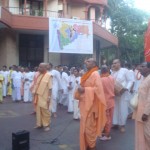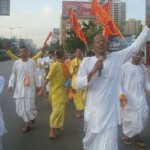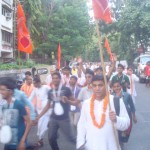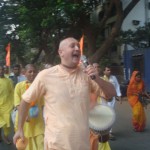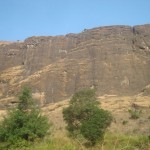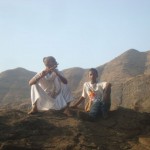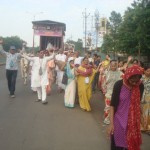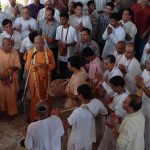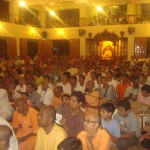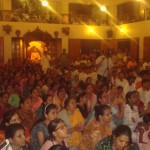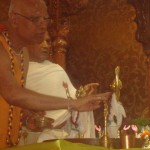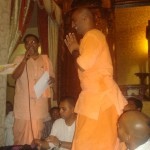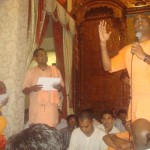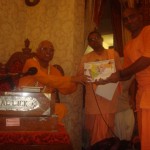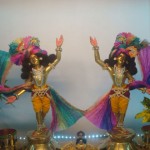On the occasion of the 500th anniversary of Lord Caitanya Mahaprabhu’s visit to Maharashtra while He was on His south India tour, the WIDC (Western Indian Divisional Council including all the ISKCON temples and centers in Maharashtra, Gujarat and Goa) organized a Sankirtana Padayatra from Kolhapur to Nasik. ISKCON devotees followed the very same path which the Lord had taken – also walking and visiting the same places He visited : Kolhapur, Aravade, Pandharpur, Satara (Krishna-venna Sangam), Pune, Mumbai, Wada, Tryambakeshwar and Nasik. This oxcart padayatra started on March 29th 2014 and ended on June 1st in Nasik. Lokanath Swami was the chairman for this padayatra and myself the overall coordinator. We had a core team of eight to ten devotees who walked the entire way, including some well trained devotees to take care of the Deities and the two oxen Arjuna and Vrindavana. This is the first padayatra walking between several ISKCON temples and centers in a relay system. Each temple or center was assisting the padayatra core team by organizing a specific phase along the route : prasad, accomodations, satsanga programs and kirtanas. Hundreds of devotees from 13 to 70 years old participated in this padayatra with great enthusiasm, some joining phase by phase or just for a few days. News about this event were published in 35 national and international newspapers. Contacts with the media and organizing press conferences were done by a very dynamic lady, Srimati Lucky Kulkarni, who had been sent by the WIDC chairman, Gauranga prabhu from ISKCON Chowpatty. This padayatra was successful due to the cooperation of the Vaisnavas in Maharashtra and the blessings and intense desire of Lokanath Swami Maharaja.
Phase 1: Kolhapur to Aravade
(March 29th to April 3rd) 110 kms
Coordinator: Gopijanavallabha Dasa (Kolhapur)
Number of participants: 85
The padayatra was divided in eight phases and since Mahaprabhu had entered Maharashtra through Kolhapur the first phase began from there on March 29. We started from our ISKCON Kolhapur center in the presence of Rama Govinda Maharaja, who spoke on Gaura lila. Around 150 devotees from different temples and centers in Maharashtra gathered in front of the padayatra cart for the morning program, after which we headed towards the Mahalaksmi (Ksira-bhagavati) temple at 6:00 am. Rama Govinda Maharaja and Braja Prema Prabu took the small Sri Sri Gaur Nitai Deities inside the temple of this self-manifested Deity of Sri Laksmi. That was a very historical moment, as Lord Caitanya had entered it five centuries before. The Caitanya-caritamrita (Madhya-lila, Chap.9 , V.281) mentions that Mahaprabhu also visited many of the 250 temples in the city, such as the Langa-Ganesh temple and the Cora-parvati temple. After breakfast, we continued walking towards Mudshingi, where we took lunch and rested until 4:00 pm. Next we proceeded towards the location of our first day’s halt, Sangawade. We did sandhya arati in the Nrsimha temple of Sangwade and Abhiram Thakur Dasa gave a class to the villagers where he talked about Lord Caitanya. The first day we covered around 27 kms. It was very hectic because most of us were walking such a long distance for the first time in our life. The next days we divided the walk in two parts, also because of the high summer temperatures, from 35°C to 45°C. We walked from 6:00 am after the morning program till 10:30 am, took lunch and rest in the afternoon, and then got on the road again in the evening from 4:00 pm to 6:30 pm. There was a good arrangement of juices, cold drinks and plenty of water. Many villagers came forward to take darsana and give donations in the form of grains, vegetables and grass for the oxen. On arrival we did the evening program which consisted of sandhya arati, a lecture and prasad. On the fourth day we journeyed from Jaysingpur to Kaulapur, stopping for breakfast and a pleasant bath on the shore of the Krsna river, and for lunch and rest at the beautiful Sri Ram Mandir in Sangli. Lokanath Maharaja’s niece had arranged the evening program and prasad at their house in Kaulapur. Maharaja came there with his senior disciples and gave a special lecture on Mahaprabhu’s Maharashtra visit. On the last day we had to cover 25-26 kms, so we started very early. Lokanath Maharaja joined us for some time in the morning and when we arrived in Aravade he and senior devotees from ISKCON Aravade welcomed us at the entrance of the Sri Sri Radha Gopal Mandir. We had sandhya arati and ecstatic kirtan in the temple premises, thus concluding the first phase of our padayatra. Aravade’s temple president Abhiram Thakur Prabhu and Dharmaraj Prabhu took care of accomodations and prasad.
Phase 2: Aravade to Pandharpur
(April 4th to 10th) 130 kms
Coordinator: Abhirama Thakura Dasa
Number of participants: 200
It is said that Sri Caitanya Mahaprabhu, while on the way from Kolhapur to Pandharpur, travelled via Aravade; the proof is that there is a village called Gaurgaon on this path, obviously named after Gauranga. On April 8th we celebrated Ram Navami in the town of Mahud. Our festival consisted of a big harinama sankirtana, Ram katha, a drama on Rama lila, full maha prasada distributed to 500 people, and a dance performance on one of Marathi Krishna bhajan by the Aravade congregation devotees. Ten young boys from Aravade also held a 300m swimming competition in a lake. We had arranged padayatra to arrive in Pandharpur on April 10 because the next day was Chaitra Ekadasi (Kamada Ekadasi), when thousands of people gather from all Maharashtra. When our dindi reached Pandharpur so many other dindis were gathered together in Lord Viththala’s temple and our padayatris did a huge harinama and made thousands of people dance.
Phase 3: Pandharpur to Satara
(April 11th to 22nd) 156 kms
Coordinator: Ramdarabar Dasa
Number of participants: 150
In the morning of April 11 all the devotees took bath in the holy Chandrabhaga river in Pandharpur. The utsava-murtis of Sri Sri Gaura-Nitai were also bathed. Then around 200 devotees, along with the murtis, entered the temple of Lord Vitthal for darsana of the Lord. After 500 years Gauranga Mahaprabhu was again entering the Pandharpur temple to take darsana of His beloved Lord. He had stayed in this dhama for eleven days. The Caitanya-caritamrita ((Madhya-lila, Chap.9 , V. 283 to 303) narrates that while in Pandharpur, Lord Caitanya was invited for lunch by a brahmana who had very much appreciated the ecstatic dancing and chanting of the Lord. At the end of the meal the brahmana informed Him that Sri Ranga Puri, one of the disciples of Sri Madhavendra Puri, was then residing in that village in the house of a brahmana. The Lord rushed to that place, immediately manifesting ecstatic symptoms at the sight of Sri Ranga Puri; both cried tears of love while embracing each other. They spent six to seven days, continually talking about Krsna. When Sri Ranga Puri left for Dvaraka, Lord Caitanya stayed four more days in Pandharpur, taking bath in the Bhima river and visiting the temple of Lord Viththala.
Sundarlal Prabhu led a very wonderful kirtana in Lord Viththala’s temple, and everyone was jubilant. After darsana devotees did nagar sankirtana in the city of Pandharpur. The next day, after mangal-arati to Sri Sri Radha Pandharinath in the ISKCON Pandharpur temple, the padayatris began their journey to Satara (Krishna Venna Sangam).
Phase 4: Satara to Pune
(April 23rd to April 30th) 140 kms
Coordinator: Vijay Vitthal Dasa
Number of participants: 80
In Satara we had a very nice program at the Krishna-Venna sangam where Mahaprabhu had takenbath. In the presence of more than hundred devotees we held an abhisheka of the utsava murtis of Gaura Nitai in the river bed in the sangam. Then devotees visited many local ancient temples, including the one where Sri Chaitanya Mahaprabhu had obtained the Sri Krsna-karnamrita of Bilvamangal Thakur. The route to Pune was very beautiful with its lush green mountains and every day there was krsna-katha by Pune and Nigadi senior brahmacaris preachers.
Phase 5: Pune to Kharghar
(April 30th to May 9th) 158 kms
Coordinator: Parthasarathi Dasa
Number of participants: 90
The Pune devotees gave a warm welcome to all the padayatris. The first two days of this phase Radheshyam Prabhu, president of the NVCC (New Vedic Cultural Center), did enthusiastic kirtana and walked with devotees.
Phase 6: Kharghar to Mumbai
(May 11th to 14th) 65 kms
Coordinator: Sandipani Krsna Dasa
Number of participants: 50
After a halt in Kharghar on May 11th Padayatra headed towards ISKCON Juhu in Mumbai. On the way we stopped in Tilak Nagar where ISKCON Chowpatty devotees had arranged prasada and accommodations for us. There was also a drama and krsna-katha. Because the oxen could not walk properly on the smooth city road from Tilak Nagar to Juhu , a distance of 13 kms, we used the tractor to pull the cart and walked along doing harinama. On the 12th padayatris reached Juhu. While at ISKCON Juhu one ox got the dengue fever; one devotee quickly got a doctor to administer medicine, and the next day the ox could resume his service on the road. The next day happened to be Narasimha Caturdasi and Lokanath Maharaja came for the festival, doing kirtana, pravacan and nagar sankirtana with the padayatris. On May 14th padayatra walked to Mira Road ISKCON temple. We had been a little disappointed by the initial low participation of devotees in Mumbai, and thanks to Juhu temple president, Brajhari prabhu, we had seventy devotees walking to Mira road. That day devotees got to distribute halvah instead of the usual peanuts and sugar packets.
Phase 7: Mumbai to Wada
(May 15th to 18th) 80 kms
Coordinator: Harsh Govinda Dasa and Sandipani Krishna Dasa
Number of participants: 35
After Mumbai we continued with 26 devotees to the Virar center, 32 kms away, which has only three brahmacharis and two grihasthas, and then to Vajreshwari. On the 18 padayatra reached Wada with 35 devotees. Rupa-raghunatha Dasa from the Wada farm project organised wonderful satsanga programs there, as he had done all along the route. Preaching was going strong in Wada, with its 200 brahmacaris and four presidents.
Phase 8: Wada to Nasik
(May 19th to 31st) 120 kms
Coordinator: Rupa-raghunatha Dasa
Number of participants: 45
From Wada we walked to Jawhar, then Tryambaka, 28 kms from Nasik. Lord Caitanya had also visited the murti of Lord Siva there called Tryambakesvara. We took bath in the Kushavarta Tirtha, and reached Nasik on May 31st. After the Deities and the devotees took bath in Rama kund we had darsana of various holy places of Nasik, Kala-Ram Mandir, Kapildhara and Panchavati Taket.
On June 3rd and 4th ISKCON Nasik organized a big closing festival, attended by Lokanath Swami. Gopalanand Prabhu, the temple president of ISKCON Nasik, and Narasimha Kripa Prabhu took care of devotees’ accommodations and prasad. Srimati Lucky Kulkarni provided media services. Due to heavy rains during their stay in Nasik devotees did not do any nagar sankirtana but indoor programs. There was the welcome of VIPS and guests, an abhiseka of Sri Sri Gaur Nitai, roaring kirtanas, and a ceremony with the distribution of certificates. Lokanatha Maharaja talked about Lord Caitanya’s travels through Maharashtra and His visit to Nasik. He explained that we were also reminded of Sri Rama, since Nasik is located near Panchavati, the place where Lord Rama had traveled to and spent some time. It was in Panchavati, on the banks of Godavari, that Sita was kidnapped by Ravana. Five hundred years ago, when Lord Caitanya walked through the same area, it was like Sri Rama coming back. As the overall coordinator, I thanked everyone for their cooperation and support. From 9.30 pm onwards a delicious prasada feast was served to all the devotees. Thus the 64 day Sankirtana Dindi from Kolhapur to Nasik was successfully completed. We estimated that close to 50,000 packets of peanuts and sugar crystals prasada was distributed along the way. Needless to say that there was lots of Gaura-katha – we had close to fifty preachers during the whole walk- during the morning Bhagavatam class and every evening after sandhya-arati.

